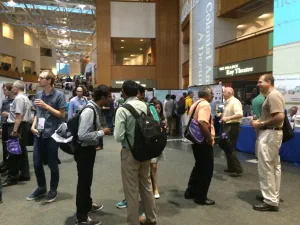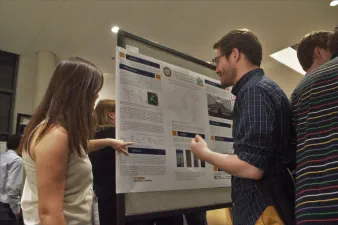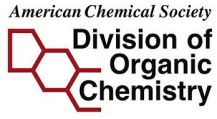Mid-Career Investigator Award
Purpose
The purpose of the Mid-Career Investigator (MCI) Award program is to recognize scientists who are more than 10 years from graduate school or post-doctoral appointment and are a current researcher in a non-academic setting (e.g. industry, government or non-profit laboratory) who have demonstrated sustained excellence in Organic Chemistry.
History
An award program to recognize early career organic chemists working in non-academic settings was started in 2007 and it was called the Technical Achievement in Organic Chemistry (TAOC) award. In 2021, the executive committee recognized the need to recognize mid-career organic chemists working in non-academic settings. Therefore, in 2021, the program was split into the Early Career Investigator (ECI) and the Mid-Career Investigator (MCI) programs.
Selection of Awardees
Awardees are selected by the Mid-Career Investigator Awards Committee from a pool of candidates nominated by their respective employers and are approved by the Executive Committee of the Division of Organic Chemistry. Nominations are accepted through the online Mid Career Investigator Award Nomination Form. The nomination package will be used by the awards committee to select Mid Career Awardees and must include the following materials:
- A letter containing the address of the nominee, and information written on company letterhead that presents evidence that illustrates the scientist’s promise, creativity, and productivity. The letter should be a maximum of three pages and should detail the impact of the candidate with examples from their work on the portfolio with relevant schemes/publications/patents, including what opportunities and deliverables they have had as an individual contributor/step lead/project lead/etc. Any additional information that documents unique, non-project related achievements made by the nominee may also be included. We recommend focusing on 3-4 selected signature accomplishments that clearly demonstrate the scientist’s creativity and productivity. The letter should also articulate what sets this candidate apart from other EC candidates in terms of their impact to science, culture, and the chemistry community, capturing their promise in their respective department and the field of organic chemistry.
- The nominee’s CV (including work address and email) that includes a description of their educational background and experience, and publication and patent record.
- Second letters will be considered but are not necessary. The main letter can be jointly submitted by more than one nominator.
- We recognize that publication practices vary by company and as such, consider all nomination packages in their entirety. If publications are not available, we ask that the nomination letter provide details of specific examples of scientific accomplishments, team leadership and outreach. Copies of selected publications and patents are not necessary.
- We recognize that company size varies significantly and encourage multiple nominations when suitable candidates can be identified. However, due to the size of the selection committee, we are unable to review more than four (4) nominees from any given company.
Associated events
There are two events associated with the Mid-Career Investigator Award. There is a dinner for the awardees, typically on Sunday evening of the ACS Fall National Meeting in combination with the TAOC and Early Career Investigator Awardees. There is a symposium (half or full day depending on the number of awardees), typically on Monday or Tuesday of the ACS Fall National Meeting.
Awardee Responsibilities
Awardees present a 30 minute scientific talk at the Fall ACS meeting that contains a substantial amount of the scientist’s own work (time period is flexible depending on number of awardees) at the ACS National Fall Meeting. As an awards symposium, under ACS bylaws there is no question and answer period.
Nominations
We encourage nominators to select candidates who are both excellent scientists and good communicators. To nominate a candidate for the Mid-Career Investigator Award you would need to complete the online nomination form-due February 11, 2025. Nominators must be members or affiliates of the ACS Organic Division. The form requires a letter highlighting the scientist’s creativity, productivity, and leadership. Additional letters and supporting documents are most welcome, but not essential. Selected nominees will have demonstrated outstanding and sustained commitment to Organic Chemistry, as well as leadership in the field. This may include leadership of project teams, a significant publication track record, academic collaborations, or in the area of Diversity, Equity, and Inclusion. Previous Early Career Investigators (Young Investigators) are eligible to be nominated for the symposium, providing a period of three years has passed since the previous nomination. Additionally, the contributions for which a candidate is nominated must be substantially different than the Early Career nomination.
Questions may be directed to Drs. Steven Wisniewski and Steve Silverman.
Submission process
Nominations are to be submitted as a single PDF file (named using the format of the Nominee’s information): Last_Name_First_Name_MCI.pdf i.e. Smith_Jane_MCI.pdf) through this online form: MCI Nomination Form
Your PDF file should have the following parts in the following order:
- Nomination Letter on Company Letterhead
- Nominee’s CV
- Supplementary Information (optional)
Award history
The Mid-Career Investigator Award commenced in 2021. All past and present awardees with their affiliations are listed on the MCI History Page by their awarded year.




